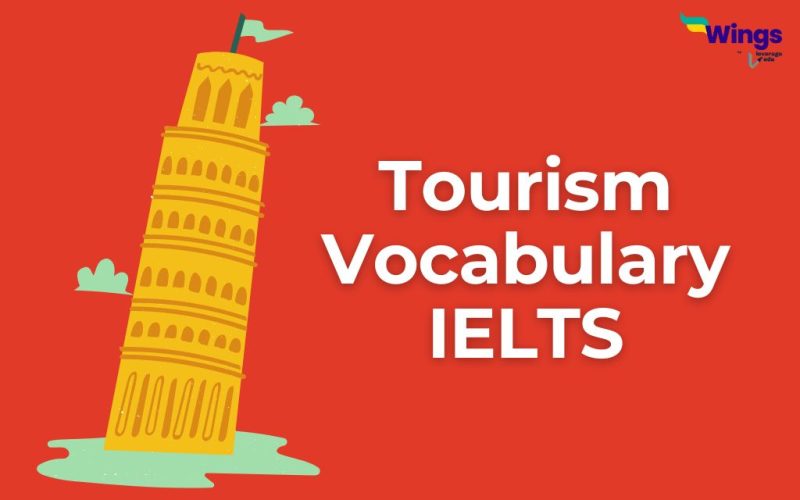Tourism Vocabulary IELTS: Tourism Vocabulary IELTS is created with the objective of assessing the candidate’s knowledge of words related to tourism, their meaning and their uses in sentences. If you are planning to score a higher band on the IELTS test, you must have a strong hold over IELTS Vocabulary. To improve your vocabulary skills you need to work on improving your fluency.
The IELTS Vocabulary consists of words related to various topics. Some of these are Climate Change, Social Media, Entertainment, Population, Animals, Health, Environment, Education, etc. The IELTS Vocabulary words include a total of 570-word families, which are divided into these topics. Read this article to know more about the Tourism Vocabulary IELTS.
Tourism Vocabulary IELTS
The IELTS Vocabulary is one of the most scoring sections of the IELTS test. Candidates preparing for their IELTS test must practice efficiently to score a higher band on the test. The best way to improve your tourism vocabulary in IELTS is to practice all the words related to tourism and their meaning. The table below highlights some of the most popular and frequently used words related to tourism.
| Tourism Words | Use in Sentence |
| Accommodation | Students studying in London are staying in temporary accommodations |
| Destination | Rishikesh is an ideal destination for weekend fun |
| Ecotourism | The Indian government is promoting eco-tourism to preserve its rich biodiversity |
| Tourist Economy | Island nations like Maldives, have a strong tourist economy |
| Heritage | The Indian geography and culture are part of its rich heritage |
| Holiday | 15th August is a national holiday in India |
| Camping | Hill stations are the perfect spot for camping |
| Footfall | The centre has a monthly footfall of 100 thousand |
| Safari | Safari park tours are very expensive these days |
| Luggage | We were allowed to carry luggage of 15kg only |
| Souvenir | He bought a model of the Taj Mahal as a souvenir of his trip to India |
| Sightseeing | Beaches are considered the best sightseeing destination |
| Itinerary | You must plan a detailed itinerary for your trip |
Also Read: Most Popular Social Media Vocabulary IELTS
Tourism Idioms and Phrases
A lot of times, the IELTS Vocabulary section includes idioms and phrases, where either you have to answer their meaning or their use in sentences. Candidates must have a proper understanding of the tourism idioms and phrases to come out with flying colours in this section. The table below highlights some of the most common tourism idioms and phrases.
| Idioms & Phrases | Meaning |
| All-Inclusive | A trip which includes all services such as food, drink, activities and accommodation |
| Affordable Travel | Trips which are affordable or within a person’s financial means |
| Bed & Breakfast | A type of accommodation which offers a place to stay and food |
| Breathtaking View | A view which is very astonishing or beautiful |
| Get Away | To go on a holiday or vacation |
| Guided Tour | Part of a trip where tourists are provided with tour-related information |
| Head Forward/ Towards | To follow a particular direction or the direction of a particular location |
| Wanderlust | The desire or love for travel |
| Middle of nowhere | A place far away from human civilization or no connectivity |
| Off the beaten track | Different places from tourist destinations |
| Swarming with tourists | Lost of tourists travelled to the same place |
| When in Rome (do as the Romans do) | If you are doing to some place, you need to follow the local rules and customs. |
FAQs
The IELTS test is conducted 4 times a month and 48 times annually.
There is no limit on how many times a person can appear for the IELTS test. As long as you are above 17 years of age, you are eligible to appear for the IELTS test.
IELTS is the abbreviation for the International English Language Testing System. It is one of the language efficiency tests, which is used in eligibility criteria to study abroad or live abroad.
The International English Language Testing System, abbreviated as the IELTS test, is an English efficiency test, which is conducted to test the candidate’s proficiency in English. The IELTS vocabulary test often contains questions related to food and health. Candidates must prepare for the vocabulary section accordingly.
Candidates who want to prepare for IELTS or any other language proficiency test, can Build a plan with Leverage Edu‘s Leverage Live classes and our top trainers and strengthen your English score as well as your application so that you can secure your spot in your dream college. Fulfil your dreams of studying abroad with Leverage Edu, to get a free counselling session, reach us at 1800527130.
 One app for all your study abroad needs
One app for all your study abroad needs
















 45,000+ students realised their study abroad dream with us. Take the first step today.
45,000+ students realised their study abroad dream with us. Take the first step today.